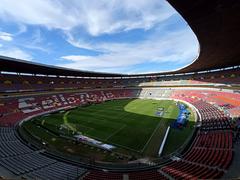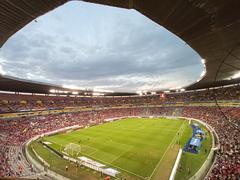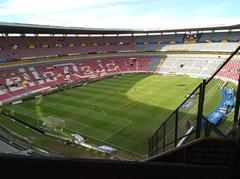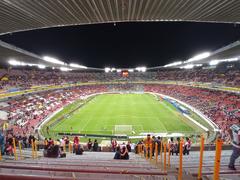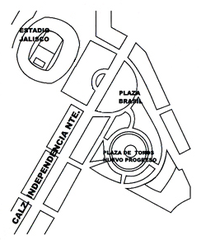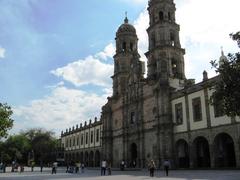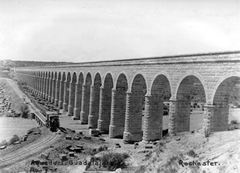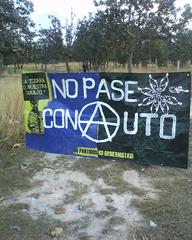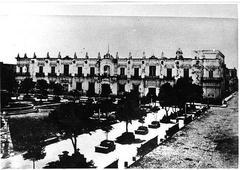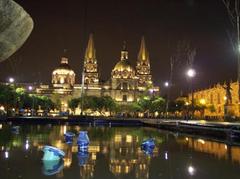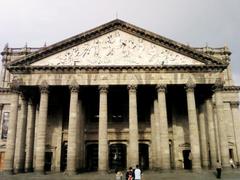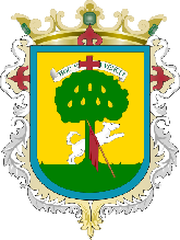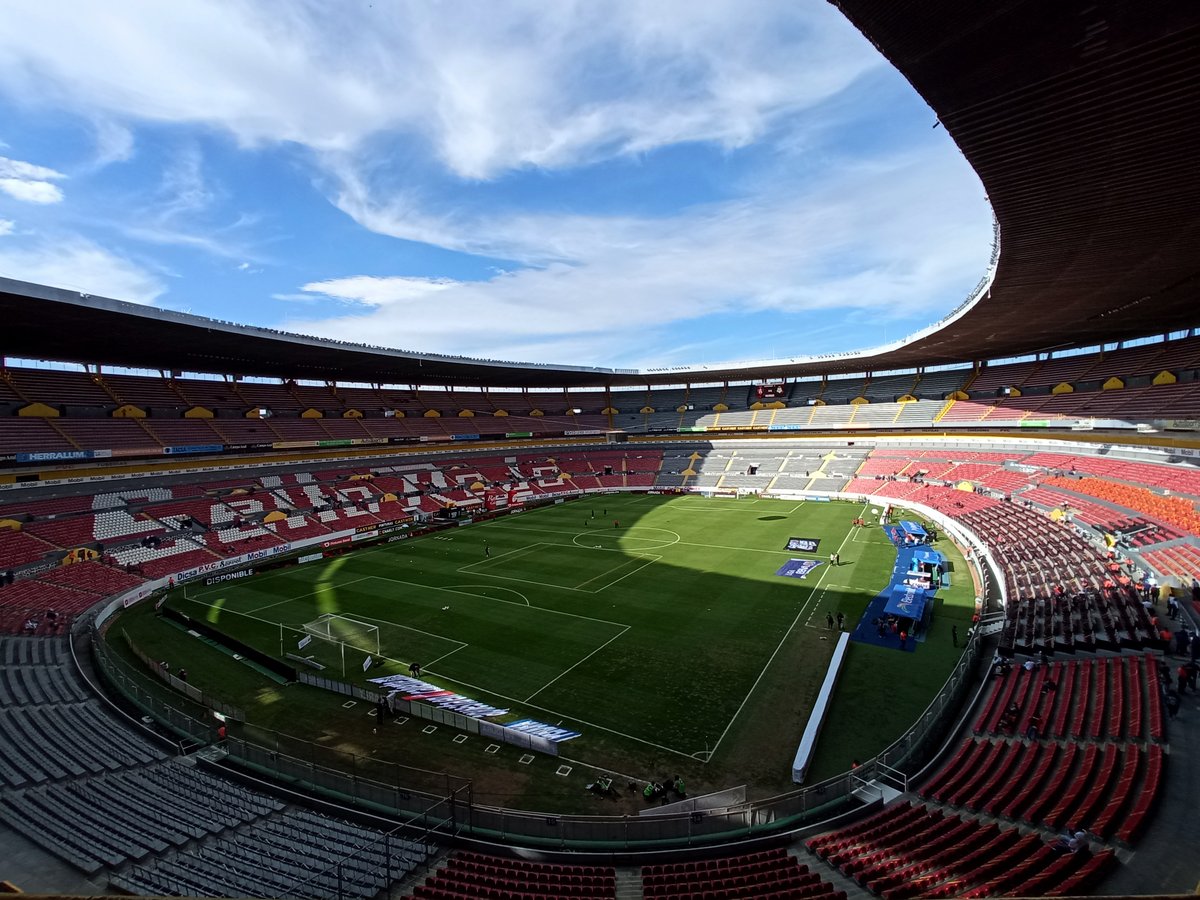
Jalisco Stadium Visiting Hours, Tickets, and Guide to Guadalajara Historical Sites
Date: 14/06/2025
Introduction: Estadio Jalisco’s History and Cultural Significance
Situated in Guadalajara’s Colonia Independencia, Estadio Jalisco is a defining symbol of Mexican football and one of the city’s most celebrated landmarks. Since its opening in 1959, the stadium has embodied the city’s vibrant sporting culture, hosting iconic events such as the 1970 and 1986 FIFA World Cups and the 1968 Summer Olympics. Its significance extends beyond sports—Estadio Jalisco is a cultural and architectural treasure that continues to attract football fans, history buffs, and travelers from around the world (StadiumDB.com; Ciudad de Guadalajara).
This detailed guide provides comprehensive information on visiting Estadio Jalisco, including current visiting hours, ticket purchasing options, accessibility features, travel tips, architectural highlights, and suggestions for exploring nearby Guadalajara historical sites. Whether you’re attending a match or exploring the city’s heritage, this resource ensures a memorable visit to one of Mexico’s most storied venues (Football Tripper; Sportskeeda; Triphobo).
Contents
- Introduction
- Historical Overview
- Origins and Conception
- Architectural Design and Construction
- Expansion and Renovations
- Major Events and International Significance
- FIFA World Cups and International Tournaments
- National and Club Football
- Visitor Information
- Visiting Hours and Days Open
- Ticket Prices and Purchasing
- Accessibility
- Travel Tips
- Nearby Attractions
- Guided Tours and Special Events
- Photographic Spots
- Architectural and Technological Features
- Cultural and Social Impact
- Legacy and Ongoing Relevance
- Frequently Asked Questions (FAQ)
- Conclusion
Historical Overview
Origins and Conception
Estadio Jalisco was conceived in the aftermath of a 1954 derby between Chivas and Atlas, when the local football scene outgrew its existing facilities. Recognizing the growing enthusiasm for football, Guadalajara’s major clubs—Chivas, Atlas, and Oro—collaborated with city officials to create a stadium that would serve as a hub for sports and community pride (StadiumDB.com; Sportskeeda). Construction began in 1956, with Colonia Independencia chosen for its strategic location and accessibility (Ciudad de Guadalajara; Football Tripper).
Architectural Design and Construction
Local firms Constructora Jalisco S.A. de C.V. and Constructora ARVA S.A. de C.V. designed an elliptical, bowl-shaped stadium with excellent sightlines from all seats (Stadium Seating Plan). The structure was completed in 1959 at a cost of approximately 18 million pesos (Sportskeeda), and inaugurated with a high-profile match in January 1960 (Football Tripper). Its initial capacity was around 30,000, quickly earning the nickname “little Azteca” for its resemblance to Mexico City’s Estadio Azteca (StadiumDB.com).
Expansion and Renovations
Over the decades, Estadio Jalisco has been expanded and modernized multiple times. The 1970 World Cup prompted a major capacity increase to over 70,000 and the addition of new amenities (Football Tripper; Stadium Guide). The 1986 World Cup brought further upgrades, and in 1999, renovations included new skyboxes and accessibility improvements (StadiumDB.com). The latest renovation in 2017 added a 360-degree screen and enhanced spectator facilities (Stadium Seating Plan). The stadium’s official capacity now stands at 56,713 (Sportskeeda).
Major Events and International Significance
FIFA World Cups and International Tournaments
Estadio Jalisco played a prominent role in the 1970 and 1986 FIFA World Cups, hosting numerous group and knockout matches, including games featuring the legendary Brazil team (Stadium Guide; Sportskeeda). It also hosted matches during the 1968 Summer Olympics, the 1999 FIFA Confederations Cup, and other international tournaments (Ciudad de Guadalajara).
National and Club Football
Estadio Jalisco has been home to Atlas Fútbol Club and Leones Negros UdeG, and previously hosted Chivas and Oro. The stadium’s vibrant match-day atmosphere, especially during the historic “Clásico Tapatío” derby, is a testament to its central role in Mexican football culture (Sportskeeda).
Visitor Information
Visiting Hours and Days Open
- Match Days: Gates open 1–2 hours before kickoff.
- Guided Tours: Typically offered from 10:00 AM to 5:00 PM, Tuesday through Sunday. Availability may change based on event schedules—always confirm via the official website or ticket office.
Ticket Prices and Purchasing
- Matches: Tickets are available online through official club websites, authorized platforms, or at the stadium box office. Prices vary by event and seating section, usually ranging from MXN 150 to 700.
- Tours: Modestly priced guided tour tickets can be booked online or on-site.
Accessibility
Estadio Jalisco is equipped with ramps, designated seating, and accessible restrooms (Sportskeeda). Visitors with disabilities should contact the stadium ahead of time to arrange assistance.
Travel Tips
- Parking: Limited to 572 spaces; arrive early, especially on match days.
- Public Transit: Accessible via Guadalajara’s light rail (nearest: “Ávila Camacho” on Line 3) and bus routes along Calzada Independencia.
- Taxis/Rideshare: Recommended for convenience and safety, especially after evening events (Mexico Travel Secrets).
- Best Times to Visit: Weekday tours and less crowded match days provide a relaxed experience.
Nearby Attractions
Explore Guadalajara’s rich heritage by visiting the Plaza de Toros Nuevo Progreso (bullring), the historic center, Hospicio Cabañas, and Plaza de Armas. Local restaurants and markets offer a taste of Jalisco cuisine (Wayward Blog).
Guided Tours and Special Events
Behind-the-scenes tours include access to locker rooms, press areas, and the pitch. The stadium also hosts concerts, political rallies, and community events (All Events in Guadalajara).
Photographic Spots
Top photo locations are the main entrance, panoramic upper tiers, and the architectural façade. Early morning and late afternoon offer the best natural light.
Architectural and Technological Features
Estadio Jalisco boasts 646 private boxes, a press box, a chapel, and ample parking (Sportskeeda). Technological enhancements include the 360-degree video screen installed in 2017 (Stadium Seating Plan). Its functionalist design, oval bowl shape, and robust structure facilitate excellent crowd management and sightlines.
Cultural and Social Impact
Beyond football, Estadio Jalisco is a hub for concerts, rallies, and community events, reflecting Guadalajara’s identity and civic pride (Ciudad de Guadalajara; GVI Archi). Managed by Clubes Unidos de Jalisco, the venue stands as a symbol of unity and local tradition.
Legacy and Ongoing Relevance
Estadio Jalisco’s legacy is secure, with its ongoing role in Liga MX and its selection as a host stadium for the 2026 FIFA World Cup (Banderas News). It remains a pillar of Guadalajara’s sporting and cultural landscape.
Frequently Asked Questions (FAQ)
What are the visiting hours at Estadio Jalisco?
Guided tours are generally available 10:00 AM–5:00 PM, Tuesday to Sunday. Match day hours vary.
How do I buy tickets?
Through official club websites, authorized vendors, or the box office.
Is the stadium accessible for people with disabilities?
Yes, it offers ramps, accessible seating, and restrooms.
Are guided tours available?
Yes, but check ahead for availability and schedules.
What are the best transportation options?
Public transit, taxis, and rideshare services. On-site parking is limited.
What should I bring to the stadium?
Valid ID, cash (for small purchases), and weather-appropriate attire. Avoid large bags and prohibited items.
Conclusion
Estadio Jalisco is an essential destination for anyone visiting Guadalajara, offering a unique blend of sporting excitement, architectural beauty, and cultural depth. Plan your visit to experience the passion of Mexican football, explore neighboring historical sites, and immerse yourself in the city’s vibrant community spirit.
Stay updated by visiting official sources, using the Audiala app, and following social media for the latest schedules and events.
Official Links and Related Resources
- Estadio Jalisco: Visiting Hours, Tickets, History, and Attractions in Guadalajara, 2025, Various Authors
- Discover La Ciudad: Estadio Jalisco, Ciudad de Guadalajara
- Estadio Jalisco, Football Tripper
- Estadio Jalisco, Stadium Guide
- Jalisco: A Thriving Hub of Culture, Luxury, and Global Events, Banderas News
- Estadio Jalisco Information, Triphobo
- Is Guadalajara Safe to Visit?, Mexico Travel Secrets
- One Week in Guadalajara, Wayward Blog
- The Role of Soccer in Mexican Culture, Mexico Historico
- All Events in Guadalajara, Allevents.in
- Estadio Jalisco Official Facebook Page
Internal Links:
- [Explore Guadalajara Historical Sites: A Visitor’s Guide]
- [Top Mexican Football Stadiums to Visit]
For the latest updates on visiting hours, tickets, and events, download the Audiala app and follow official social media channels. Enjoy your visit to Estadio Jalisco and discover why it remains a beloved symbol of Guadalajara’s sporting and cultural heritage.
